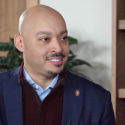Assistive Technology Expo showcases possibilities for people with disabilities
Monica KamalRossa emphasizes the importance of assistive technologies for persons with disabilities by asking a question: “How many of you can live without your shoes every day, every season — yes, even in winter?”
KamalRossa, coordinator of Madison’s Spinal Cord Injury Group, explains, “Our canes, wheelchairs and computer systems are how we navigate to get around to school, work and our places of worship.”
Imagine trying to live completely without a telephone, she says. “Without voice-command software and other technology, some persons with disabilities can’t communicate at all.”
“Assistive technology is a foundation to the quality of life that almost all persons with disabilities require,” says KamalRossa, who injured her spinal cord in a 2001 skiing accident and uses wheelchairs to get around. Such technologies enable more people to participate in their communities, which benefits the entire community, she adds.
KamalRossa is the lead organizer for the 25th annual Assistive Technology Expo, to be held from 10 a.m.-3 p.m. on Wednesday, Nov. 4, in the Engineering Centers Building, 1550 Engineering Drive at the University of Wisconsin–Madison. The event is free and open to the general public.
The expo showcases some of the latest advances in technology that can offer people with disabilities new opportunities to participate in school, employment and community life. Roger Smith, professor of occupational therapy from UW-Milwaukee’s College of Health Sciences, will deliver the keynote address.
“We are very excited to have UW students from different departments showcasing their projects,” says KamalRossa. “New this year will be a health-and-wellness panel with four people with disabilities discussing adaptive kayaking, sit skiing with the Birkebeiner last year, hand cycling and adaptive camping.”
The expo debuted on Oct. 18, 1985, at Union South. The Southwest Wisconsin Rehabilitation Association (SWRA) and the Rehabilitation Psychology Program in UW–Madison’s Department of Rehabilitation Psychology and Special Education (RPSE) had been seeking a project that could benefit rehabilitation professionals, people with disabilities, and the community in general, says Norm Berven, professor of rehabilitation psychology.
Berven, who coordinated the expo for 20 years, says about two dozen organizations that marketed or used technology related to disability and rehabilitation participated in the inaugural event, which was jointly sponsored by SWRA, RPSE and the Wisconsin Division of Vocational Rehabilitation (DVR). Since that first year, more organizations have participated, and the number of sponsors has grown, he says.
“Technology has changed dramatically since 1985, when Apple IIe computers were among the most widely used, and cell phones, the Internet and GPS technology were still years away,” Berven says. “Advances in technology have opened many possibilities for people with disabilities, and it is these advances that are highlighted at the expo.”
He credits the active participation of UW–Madison’s College of Engineering for taking the expo to a new level, especially Jay Martin, a professor in mechanical engineering and biomedical engineering.
Martin directs UW-CREATe (Center for Rehabilitation Engineering and Assistive Technology), which engages in engineering research, design and education to help provide additional independence to individuals with disabilities. He also is the principal investigator for Midwest Alliance, a National Science Foundation (NSF) project to facilitate the involvement of students with disabilities in the sciences, technology, engineering and math.
“Professor Martin has involved a number of faculty and programs in engineering and has also organized poster presentations by his students, demonstrating innovations that they have been involved in developing,” Berven says. “He has also brought some important keynote speakers and panels to give presentations at the expo.”
KamalRossa became acquainted with Martin and other members of the expo’s planning committee through her active involvement, as participant and volunteer, in adaptive fitness and recreation and assistive technology projects. That eventually led to her role with the expo.
“I have attended a few AT Expos over the years because it is such an important event,” she says. “I am always curious about what is new and I want to try out the ‘solutions’ and ask questions.”
“The expo has always sought to attract a diverse audience, and several hundred people typically attend each year,” Berven says. Attendees include many faculty, staff, and students from rehabilitation-related majors (e.g., rehabilitation psychology, occupational therapy, communicative disorders, special education, physical therapy, nursing), and engineering, computer science and technology.
The expo also attracts entire classes from UW–Madison, Edgewood College, Madison Area Technical College, UW-Whitewater and UW-La Crosse, as well as professionals from rehabilitation agencies, health organizations, and elementary and secondary schools.
“We have had elementary school classes attend as a disability-awareness activity, and we once had a high school class that was working on projects to design accessible spaces to accommodate people with disabilities,” Berven says.
From the general public, many people with disabilities and their family members come to learn about advances in technology that might be of benefit to them.
For more information on the Assistive Technology Expo, including the schedule, exhibitor lists and parking information, go to http://atexpo.blogspot.com. If you have any questions, contact Monica KamalRossa at Monica@SCI-Madison.org or Sarah Lincoln at Sarah.Lincoln@dhs.wisconsin.gov.
Tags: events, School of Education



